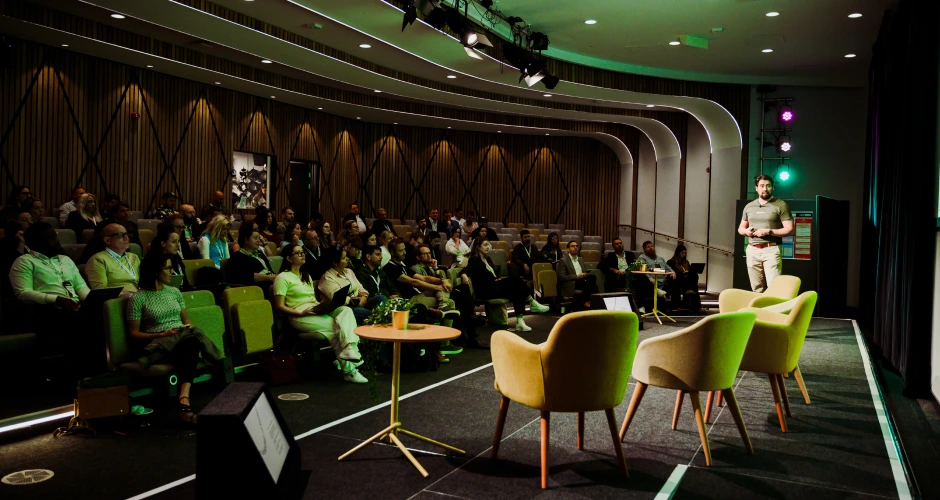In episode 10 of our "Tour Tech: Your 5 Weekly Takeaways to Tourism Success" podcast series, part of the EU-funded Tourbit project, we learn about how technological solutions can improve energy efficiency and support the transition towards greener energy sources. This article explores how Builtrix works with Visabeira Group, a hotel chain with operations in Portugal and Mozambique.
Data Analysis for Smart Energy Management
Javad Hatami, CEO and Co-Founder of Builtrix, outlines that its energy intelligence platform leverages Artificial Intelligence (AI) to optimise energy use and reduce carbon emissions in buildings. Its cloud-based solution assists businesses across various industries, focusing on the hospitality sector, and is currently implemented in over 1,000 buildings across Italy, Switzerland, France and Portugal.
The Builtrix platform integrates with existing smart meter infrastructure, eliminating the need for costly additional installations, combining this with data from energy suppliers to have a comprehensive picture of energy supply and consumption patterns. By analysing energy consumption data alongside a range of other variables, Builtrix generates tailored recommendations. These can include:
- Notifying users of fluctuations in carbon intensity on the electricity grid, allowing them to shift energy consumption to periods with more renewable energy generation.
- Daily reports that track energy use and carbon footprint, providing valuable insights for businesses and helping them to make more informed decisions when negotiating with utility providers.
Paulo Soeiro, Head of Engineering and Innovation at Visabeira Group, explains how the company utilises the Builtrix platform to monitor energy consumption and carbon footprint at seven of its hotels within the Montebello Hotels portfolio to maximise efficiency while maintaining the quality of experiences for its guests. By following the recommendations suggested by the Builtrix platform, Visabeira Group has implemented strategies such as:
- Optimising pool heating: Renewable energy sources, such as solar power, are utilised to heat swimming pools during daylight hours, reducing reliance on carbon-intensive sources at night.
- Sustainability reporting: Builtrix data is integrated into Visabeira Group’s sustainability reporting practices, ensuring transparency and traceability of their environmental efforts. Visabeira Group aspires to share this information with online travel agents so that guests become aware of the company’s sustainability ambitions when making a booking and can play a part in minimising excessive energy usage during their stay.
Crucially, new regulations such as the EU’s Corporate Sustainability Reporting Directive (CSRB) demand a higher standard for sustainability data. While previously, companies could make vague claims, sustainability data now needs to be as verifiable and auditable as financial data. This shift is crucial for achieving long-term goals such as carbon neutrality, with data dashboards an essential tool to identify the necessary changes to achieve this ambition.
Utilising the Power of AI Algorithms
Javad outlines how AI helps Builtrix act as an intelligent assistant, transforming raw energy consumption data into actionable insights and recommendations. Regardless of data volumes, AI algorithms identify patterns and spot potential inefficiencies. When deploying AI algorithms, safety and quality checks are crucial to ensuring the recommendations and insights provided by AI are meaningful and relevant to the context of each business and its diverse needs. This focus on robust AI empowers businesses to make decisions with confidence.
By employing various algorithms, Builtrix can:
- Benchmark: The algorithm compares a building's energy use to similar structures, ensuring a like-for-like comparison. This avoids misleading results that might occur when comparing a small hotel to a large one.
- Forecast: Having a baseline means future energy needs can be predicted based on various factors, including occupancy levels and weather conditions. Weather is an important variable which significantly impacts energy use, particularly for air conditioning; a major energy consumer that can account for 30-40% of energy consumption in some businesses during the summer.
- Alerts: From an established baseline of a building's energy consumption, significant deviations can trigger alerts, indicating potential issues like equipment malfunctions or identifying areas for improvement. These alerts empower users to investigate and take corrective actions.
Driving Organisational Change
Paulo emphasises the importance of clear communication and collaboration between partners to align goals and expectations, especially when implementing new technologies. For example, this involves anticipating critical points that may result in delays so that these can be avoided, speeding up operational change processes and minimising friction and dissatisfaction among staff. He also highlights the value of having a dedicated project champion to drive progress within the company and a process champion from a smaller company, such as Javad at Builtrix who can demonstrate how to make operational processes more flexible.
Javad explains that many companies recognise the need to become more sustainable but lack a clear direction. The absence of data and confusion around regulations can sometimes hinder progress. To address this, larger initiatives can provide valuable support. For example, Turismo de Portugal’s Empresas Turismo 360º platform promotes sustainability and Environmental, Social and Governance (ESG) reporting in the gas and energy sector, specifically tailored towards hospitality companies. Javad predicts that the concept of sustainability will rapidly evolve. Instead of being a separate concept attached to specific areas, such as finance or energy, it will become an inherent consideration. This shift will see sustainability seamlessly integrated into all aspects of society, where sustainability won't be a label, but the baseline.
Similarly, Paulo underscores how the transition to data-driven energy management requires maintenance teams to radically change the way they work. Traditionally focused on simply keeping systems running, Visabeira Group now aims for intelligent deployment. A phased approach to changing processes is crucial to ensuring this new strategy is implemented effectively. Starting with the advising phase, the Builtrix system suggests how to optimise energy use by indicating when to turn equipment on and off. This will then progress to automated control with human oversight, and finally, fully autonomous operation. This three-step approach is seen as a natural progression, allowing teams to focus on customer experience rather than manual machine management.
Key Takeaways
Businesses eager to become more sustainable often face a two-pronged challenge: understanding the ‘what’ and ‘how’ of achieving their goals. While public entities and industry leaders can provide guidance on what needs to be done, companies often lack the data and tools required to make informed decisions. By providing this missing information with the help of inexpensive smart meters and AI algorithms, Builtrix empowers businesses to take concrete actions towards a more sustainable future. This shift in mindset through embracing new technologies and data-driven decision-making is crucial for businesses to succeed in a more sustainable future through benchmarking and forecasting energy usage, with alerts providing early identification of excess energy usage. This ultimately reduces expenses and thereby maximises profitability.
Through rigorous data analytics, organisations can obtain reliable, transparent and traceable information regarding their energy consumption. This not only helps identify opportunities to be more efficient but also provides crucial input for detailed sustainability reporting. Most importantly, with technology being applied behind the scenes and facilitating increasing levels of automation, hotels such as the Montebello chain can focus more on maximising guest experiences.
Nevertheless, the process of improving operations is never simple. It requires a phased approach and considerable effort to ensure all employees are supportive of the changes taking place. With such a complex demand, having internal and external champions is key to ensuring the process runs smoothly and quickly identifies and eliminates potential obstacles.
Here are the five key takeaways:
- We must take action now to mitigate the impact of our carbon footprint. This can be achieved through smart management without sacrificing guest comfort.
- Advanced energy management technology is crucial for improving energy efficiency and operational cost-effectiveness.
- By leveraging data effectively, it becomes possible to make better and traceable management decisions to avoid the risk of greenwashing.
- Consumers show greater affinity with brands that stand for something, demonstrating how striving for better to meet environmental objectives can improve company reputations.
- Adaptable and scalable solutions are key to addressing critical challenges, where versatility is key to meeting new demands across both large and small businesses.
The podcast is part of the Tourbit project, co-funded by the EU's COSME programme, with the support of the Catalan Tourist Board, Barcelona Chamber of Commerce, Paris&Co, Arctur Doo, Hub Brussels, Iceland Tourism Cluster, Lapland University of Applied Sciences and NEST - Tourism Innovation Center.





.svg)






.webp)

.webp)







.webp)
